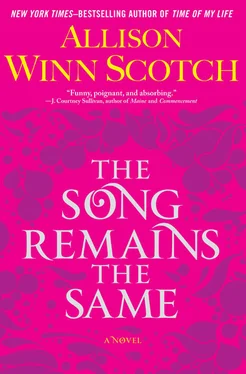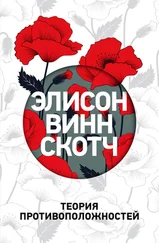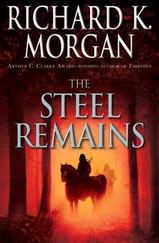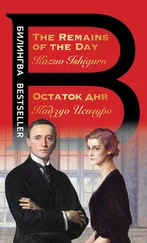“Oh, now, Nelly Margaret! Don’t start testing me! Don’t start personalizing this! But I would have known, and this has nothing to do with you and Peter, and besides, the fact that if he came back for graduation, do you honestly think”—she pushes her breath out now, and I envision her turning a particularly flush shade of purple—“well, do you honestly think that if he were still checking up on you, after all you’ve been through with the crash, he wouldn’t have tried to reach you now ?”
Something sharp detonates inside of me. My heart.
“Oh,” I say, because it’s all I can manage. This has never occurred to me before this very moment. That my father is out there and hasn’t extended himself even after…even after all of this.
“Oh, see, now look. I always talk too much when I’m upset!” my mother bleats. “Your sister gets that from me. I just can’t keep my mouth shut. I’m sorry, I shouldn’t have put that out there.” She pauses. “But I’ve gone and said it, and really, that’s probably the most cathartic thing for us both. So darling, please, let this go. Let him go. You are doing wonderfully and your marriage is healing, and you’re back at the gallery, and life is looking so up it can’t look any higher.”
I nod, and then I click good-bye, which is for the best so that she can’t hear my tears, either. I kick his sketchbook, the one that Jasper promised was a map back to my father’s world, from the coffee table to the floor, where it splays and flops open like a dead fish.
I should have trusted that instinct, I realize. To hate him. To exorcise him from my life because, really, who needs a father once you’ve grown and made it on your own?
It’s only later, once I’ve tucked myself under my sheets, that I realize how wrong I was: not that I didn’t need a father, but that my instinct was never to hate him. That, in fact, it was the opposite: that I loved him so much that I was never capable of fully letting him go. I stare at the blackened ceiling, waiting for sleep to come, haunted by the notion that if I can’t trust my own instincts, then, well, what else have I got?
“There’s a Light That
Never Goes Out”
—The Smiths
M aybe he’s dead,” Peter says when he calls me the next day from his retreat in the Berkshires, and I am weaving my way through foot traffic. I haven’t asked if Ginger will be there because it seems almost beside the point, but still, a niggling part of me wonders. The old me wants to ask— is Ginger there? —but the new me tempers her, trying to be more confident, trying to move on from the scars of the past.
“Is that supposed to be helpful?” I press my finger into my ear to ward off the car horns. It’s started to drizzle, the bleak clouds hovering too close, bearing down, threatening suffocation.
“I’m just saying. Maybe he’s dead, and that’s why he didn’t call you when the crash happened.”
An umbrella nearly takes my eye out as a fellow pedestrian jockeys for sidewalk space, and I spin around and flip him off with my free hand. But he’s already pushed beyond me, unaware of his intrusion, unaware of my overreaction to it.
“He can’t be dead.” I sigh, annoyed at the chilliness of Peter’s suggestion but simultaneously disheartened because death seems like the only decent explanation to prove me wrong. “Even if he were the most reclusive of recluses, someone would have known. It would have been reported. We’d know.”
“Well, then, this doesn’t make sense.”
“None of this makes sense!” I say a little too loudly while waiting for the light, and the two men next to me, hipsters in their twenties with scarves tied in perfect knots around their necks, baseball hats with ironic graphics tugged low on their faces, turn to stare. Then they do double takes at the recognition that, yes, it’s me—the freak from People , the anomaly from American Profiles —and my eyes bulge back at them. Just move the hell along, there’s nothing to see here. So they adjust their hats even lower and step off the curb, despite the still-red light.
Peter and I click good-bye, and I shove my phone into my bag, pulling out my iPod, stuffing the earbuds in. I filter through the music, looking to match the angry beat of my steps. I settle on the Smiths and keep moving.
It’s been less than a full day since my conversation with my mom, and already I can feel myself coming unhinged in a way that I haven’t been since the immediate aftermath of the accident. The grayish, dour me rearing her head despite my best efforts to shove her back. My mother’s revelation—that after months of my trying to pin myself to my father, perhaps he never wanted to be pinned down in the first place—has set me off, a skein of yarn coming completely unwound.
Last night, after sleep refused me, I succumbed to Anderson’s helpful text to “grab a six-pack and just let it go.” I threw my phone onto Peter’s side of the bed, tossed the sheets back, and slunk toward the kitchen. I started with the six-pack, despite my medication, despite the side effects. Truth be told, it felt good. To be loose, to blunt the endless chatter in my head. Armed with the alcohol, I plunked down on the piano bench and played—spontaneously, freely—until finally, yes, I adhered to the second part of the text, and let go. I called Jasper Aarons and left him a long, expletive-filled message about what he could tell my dad should they ever come in contact, and then I stormed around the apartment, scooping up my father’s sketchbook, tearing out at least half the pages and tossing them into the garbage bin, the lid slamming with approval and finality. I pulled out my childhood pictures, excising him from my photo albums—not, to be fair, that he was in all too many pictures to begin with. But a few, yes. A posed family shot out by the woodshed. A hazy captured moment during an Arizona vacation, a drop from the nearby pool blurring the outer corner of the lens, the sun reflecting idyllically to project a portrait of the perfect family unit.
And then there was one of us that I’d missed the first time, tucked in between the pages, not in the plastic sleeves themselves. It must have been taken that summer, the summer of the white house, the one buried somewhere in my memory. Who manned the camera? Perhaps me, because the photo was of my dad, sleeping, solitary, content. In the background, I could barely make out a sliver of a painting in progress. He has a mustache and a goatee, which he appears to have grown for this occasion alone, as he’s scruffy but clean-shaven in every other image, and his cheeks are tanned, his eyelashes thick and protective. There’s a baseball bat on the floor underneath the couch on which he sleeps and splatters of paint, well, everywhere. His fingers, the pillows, the hardwood next to the slippers near the sofa.
I stared at the photograph, with the fourth beer blurring my edges, and cocked my head, a rage sparking through me like dynamite. Rory claimed that it took me months the first time around to believe that he had gone. I flipped my palm over and stared at the scar entrenched deep in my skin. And here we were all over again: my refusing to acknowledge the simple truths. I had fallen from the sky and my dad hadn’t come to try to heal me. Hadn’t abandoned his selfish need for solitude to wander out into the bright lights of the world and rescue his little girl.
Well, fuck that. Well, fuck you!
I popped the lid to the fifth beer and fell, exhausted, onto the sofa. It turns out that my theory was right all along: people don’t change. Me, my dad, no one. Screw the red couch, screw the sweaters and the cute little blazers and the closet that now looked like the underside of a rainbow. Screw the new, fabulous me. Screw it, screw her, screw him.
Читать дальше












